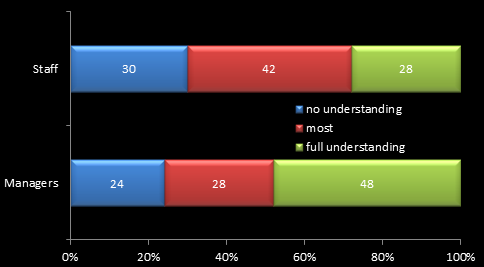It is unquestioned, that core competencies are essential for the success of a company. Hamel and Prahalad, two top strategic management thinkers employed the term core competencies in order to highlight the combined “set of skills, activities and resources that, together, deliver customer value, differentiate a business from its competitors and, potentially, can be extended and developed.”* Bain & Company argues: “It embodies an organization’s collective learning, particularly of how to coordinate diverse production skills and integrate multiple technologies. Such a Core Competency creates sustainable competitive advantage for a company and helps it branch into a wide variety of related markets.”
Despite the relevance of this bundle of constituent skills and technologies I would like to recommend your company to test, whether each and every employee and manager knows them and is able to transfer and to communicate them to your customers. I know that this might sound a little bit strange, but let us have a look at corporate practice. A research and consulting company observed the following results among Austrian retail banks. The key issue was to which extent managers and employees know the core competencies of their organization. The results are definitely surprising.
82.5 percent of managers and employees confirmed the existence of core competencies, but…

Figure: Share of respondents regarding their knowledge of core competencies
Data Source: emotion banking newsletter, May 2012 / VICTOR Global 2011
So what can be recommended to improve the situation (not matter whether your organization is a bank, a service based organization or a production company):
- In general it is recommended that your organization should employ internal communication structures to inform its members about the vision, the strategy, the existing and the needed competencies.
- Your organization should support regular meeting for “competence holders”.
- Your organizations should also support a continuous transfer of know how within the organization. Networking within the organization – you might employ “an internal facebook approach” becomes an important activity.
- Core competencies are not stable; hence your organization should always search for the development of new competencies.
- Your organizations should try to focus on competencies. Opposite to this: Areas in which your organizations cannot establish or maintain core competencies, represent candidates for outsourcing.
- The ability to set up and to run knowledge-networks (i.e. think about open innovation!) can be a fundament for future competencies.
- Exchange with customers and colleagues can support your “competence holders” to identify new market opportunities.
Literature and Links
*Johnson, G.; Whitting R. & Scholes, K. (2011): Exploring strategy. FT Prentice Hall. Harlow.
* Bain & Company: Core Competencies.
